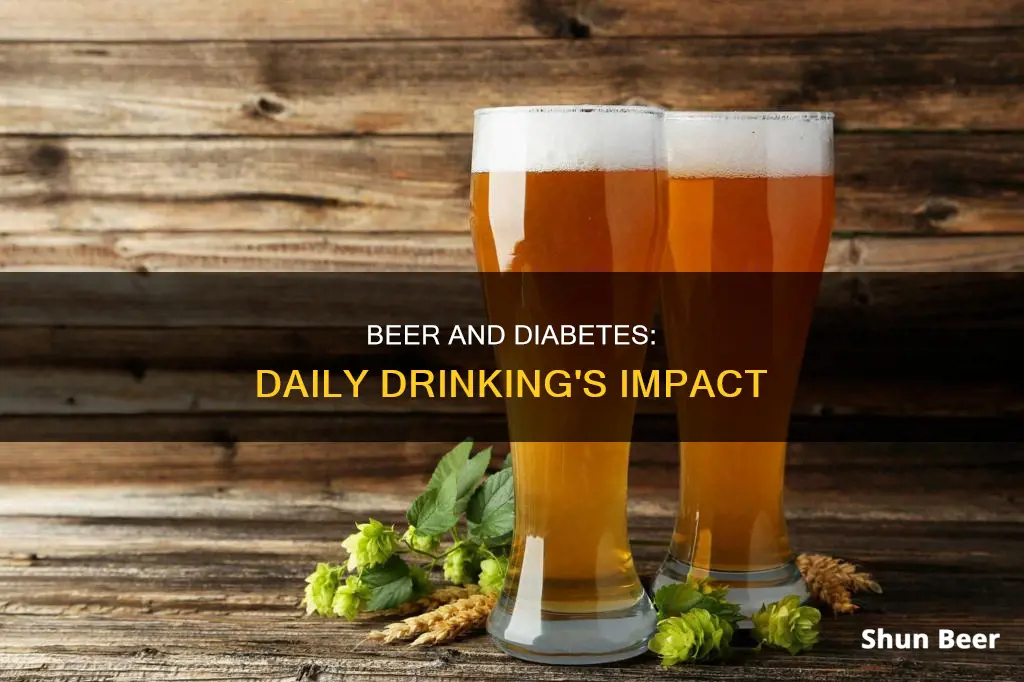
Drinking alcohol can be a complicated topic for people with diabetes. Alcohol can interfere with the liver's ability to regulate blood sugar levels, and it can also interact with diabetes medications. This means that drinking beer every day may increase the risk of high or low blood sugar and cause other health issues. However, some studies suggest that light drinking (no more than one to two drinks per day) may be beneficial for people with diabetes.
| Characteristics | Values |
|---|---|
| Alcohol's impact on blood sugar | Alcohol can cause blood sugar levels to rise or fall, depending on how much you drink. |
| Alcohol's interaction with diabetes medication | Alcohol can interact with diabetes medications, such as insulin, sulfonylureas, and meglitinides, leading to hypoglycemia or "insulin shock." |
| Liver function | Alcohol prevents the liver from releasing glucose into the bloodstream and regulating blood sugar. |
| Drinking on an empty stomach | Drinking alcohol on an empty stomach increases the risk of low blood sugar. |
| Testing blood sugar before drinking | It is recommended to test blood sugar levels before consuming alcohol. |
| Hypoglycemia | Alcohol can cause hypoglycemia, with symptoms including dizziness, sleepiness, and disorientation. |
| Safe drinking limits | Women with diabetes should have no more than one drink per day, while men should have no more than two drinks per day. |
| Calories and weight gain | Alcoholic drinks contain calories, which can lead to weight gain and make diabetes management more challenging. |
| Carbohydrates in drinks | Beer and sweetened mixed drinks are high in carbohydrates, which can raise blood sugar levels. |
What You'll Learn

Alcohol and diabetes medications don't mix well
Drinking alcohol while taking medications that also lower blood sugar can lead to serious interactions due to an additive effect. Even modest amounts of alcohol can significantly lower blood sugar for up to 8 to 12 hours after consumption. This effect may be more pronounced when alcohol is consumed on an empty stomach or after exercise.
Additionally, excessive alcohol use can lead to weight gain or high blood pressure in individuals with type 2 diabetes. It is important for individuals with diabetes to consult their healthcare provider to understand the impact of alcohol on their health condition and to follow guidelines for moderate alcohol consumption if they choose to drink.
When it comes to specific diabetes medications, there are several interactions to be aware of. For example, metformin and alcohol can interact harmfully, potentially leading to life-threatening conditions such as hypoglycemia and lactic acidosis. Binge drinking or chronic heavy drinking while taking metformin increases the risk of extremely low blood sugar levels.
Another medication, chlorpropamide, used to treat type 2 diabetes, can cause an unpleasant disulfiram-like reaction when combined with alcohol. This reaction includes symptoms such as flushing, headache, and nausea.
It is crucial for individuals with diabetes to be aware of these interactions and to consult their healthcare providers before consuming alcohol while taking any diabetes medication. The combination of alcohol and diabetes medications can have serious consequences, and it is important to prioritize health and safety.
Andre the Giant's Unbelievable Beer Drinking Capacity
You may want to see also

Alcohol prevents the liver from regulating blood sugar
Alcohol can prevent the liver from regulating blood sugar. The liver is responsible for stabilising glucose levels by storing carbohydrates and releasing them into the bloodstream when necessary. However, when alcohol is present in the body, the liver prioritises metabolising it over maintaining blood glucose levels. This can lead to hypoglycaemia, or low blood sugar.
The liver's choice to metabolise alcohol instead of maintaining blood glucose levels is particularly likely when a person drinks without eating, so it is recommended that people with diabetes eat while drinking.
The symptoms of hypoglycaemia can be difficult to distinguish from those of drunkenness. These include slurred speech, drowsiness, confusion, and difficulty walking. This makes it even more important for people with diabetes to be cautious when drinking.
Drinking alcohol can also affect blood sugar levels in other ways. For example, it can stimulate the appetite, leading to overeating and further increases in blood sugar. Alcohol also contains a lot of calories, which can make weight loss more difficult.
Pigs and Beer: A Curious Combo
You may want to see also

Drinking on an empty stomach is dangerous
Drinking without eating can also increase the risk of alcohol poisoning, a life-threatening condition. Signs of alcohol poisoning include hypothermia (low body temperature), loss of coordination, slow or irregular breathing, stupor, and unconsciousness. If you or someone you know exhibits these symptoms, seek immediate medical attention.
Additionally, drinking on an empty stomach can lead to impaired coordination, slowed brain function, and listlessness. It can also cause tooth decay, as frequent vomiting from excessive drinking can damage your teeth over time.
Furthermore, drinking on an empty stomach can affect your weight. Alcoholic beverages contain a significant number of calories, and drinking without eating can still lead to weight gain. Alcohol reduces the amount of fat burned by the body for energy.
It is worth noting that drinking on an empty stomach may not pose additional risks for people with diabetes. While alcohol can interfere with blood sugar levels, the available evidence suggests that eating while drinking does not necessarily improve short-term health outcomes. However, it is always advisable to consult a healthcare professional for personalized advice.
Beer and Gastritis: Is There a Link?
You may want to see also

Alcohol can cause hypoglycaemia
The liver is responsible for eliminating toxins from the body and ensuring optimum blood sugar levels. Excessive alcohol consumption can prevent the liver from releasing glucose into the blood efficiently. Binge and heavy drinkers who drink on an empty stomach are at a high risk of suffering from this condition. This is because drinking on an empty stomach makes it extremely difficult for the liver to release glucose into the bloodstream.
Alcohol can also cause hypoglycaemia in people with diabetes. Their liver may not be able to produce enough glycogen to prevent blood sugar levels from falling below optimum levels. Diabetics who drink alcohol are at high risk of suffering from low blood sugar levels overnight, especially if they go to bed without taking additional carbohydrates.
Symptoms of hypoglycaemia include:
- Sweating
- Weakness
- Shakiness
- Nervousness
- Pounding or racing of the heart
- Seizures
- Coma
To prevent hypoglycaemia, it is recommended to:
- Drink in moderation
- Eat before drinking
- Monitor blood sugar levels while drinking
- Take immediate action to raise blood sugar levels when symptoms of hypoglycaemia begin
Gluten Allergy and Beer: What's Safe to Drink?
You may want to see also

Drinking in moderation is key
Moderate drinking is defined as no more than one drink per day for women and no more than two drinks per day for men. One drink is equivalent to 12 ounces (360 milliliters) of beer with 5% alcohol content. It is important to note that the alcohol content in beers can vary, and some cans or bottles may contain more than 12 ounces, so it is crucial to check the alcohol content and adjust your intake accordingly.
Drinking in moderation is essential because alcohol interferes with the liver's ability to regulate blood sugar levels. When you consume alcohol, your liver prioritizes breaking down alcohol over releasing stored glucose into the bloodstream, which can lead to a rapid drop in blood sugar levels, a condition known as hypoglycemia. This is especially important for individuals with diabetes who are already at risk of low blood sugar levels. Additionally, drinking alcohol without eating food simultaneously increases the risk of hypoglycemia. Therefore, it is recommended to drink alcohol with a meal or a carbohydrate-rich snack to help maintain normal blood sugar levels.
Another reason why drinking in moderation is crucial is that alcohol is often high in calories and carbohydrates, which can lead to weight gain and make it more challenging to manage diabetes. Alcoholic drinks, such as beer and sweetened mixed drinks, tend to be high in carbohydrates, which can raise blood sugar levels. Furthermore, the calories from alcohol are stored in the liver as fat, and this liver fat contributes to insulin resistance, leading to higher blood sugar levels over time.
Excessive alcohol consumption can also worsen diabetes-related complications such as neuropathy (nerve damage), eye disease, and disturbances in fat metabolism. Additionally, alcohol can interact with diabetes medications, increasing the risk of hypoglycemia or hyperglycemia, depending on the type of medication. Therefore, it is essential to consult with a healthcare provider to understand how alcohol may affect your specific condition and medication regimen.
In conclusion, drinking in moderation is the key to maintaining overall health and managing diabetes effectively. By understanding the impact of alcohol on blood sugar levels, calorie intake, and medication interactions, individuals with diabetes can make informed choices about their alcohol consumption and take the necessary precautions to stay within safe limits.
Priestly Beer Consumption: Is It Allowed?
You may want to see also







